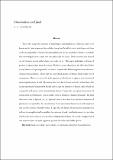Universalism and junk
Abstract
Those who accept the necessity of mereological universalism face what has come to be known as the junk argument due to Bohn [2009], which proceeds from (i) the incompatibility of junk with universalism and (ii) the possibility of junk, to conclude that mereological universalism isn't metaphysically necessary. Most attention has focused on (ii); however, recent authors have cast doubt on (i). This paper undertakes a defence of premise (i) against three main objections. The first is a new objection to the effect that Bohn's defence of that premise presupposes far too much. I show that one can defend premise (i) from a much weaker set of assumptions. The second objection, due to Contessa [2012], is that those who accept unrestricted composition should only accept the existence of binary sums (which are compatible with junk) rather than infinitary fusions. I argue that this conception of unrestricted composition is problematic: it is in conflict with an intuitive remainder principle. The final objection is due to Spencer [2012]. His view is that there is no absolutely unrestricted plural universal quantifier; so any statement of the unrestricted fusion axiom will simply not rule out the existence of junky worlds. I argue that the failure of unrestricted quantification will not be enough by itself to establish the existence of junk. Furthermore, it is not clear whether this view counts as a form of mereological universalism. As a result, I suggest that if one wants to reject the junk argument, premise (ii) is the only viable option.
Citation
Cotnoir , A J 2014 , ' Universalism and junk ' , Australasian Journal of Philosophy , vol. 92 , no. 4 , pp. 649-664 . https://doi.org/10.1080/00048402.2014.924540
Publication
Australasian Journal of Philosophy
Status
Peer reviewed
ISSN
0004-8402Type
Journal article
Collections
Items in the St Andrews Research Repository are protected by copyright, with all rights reserved, unless otherwise indicated.

